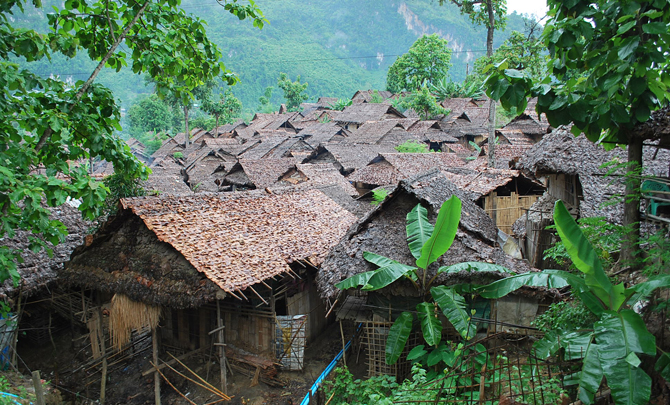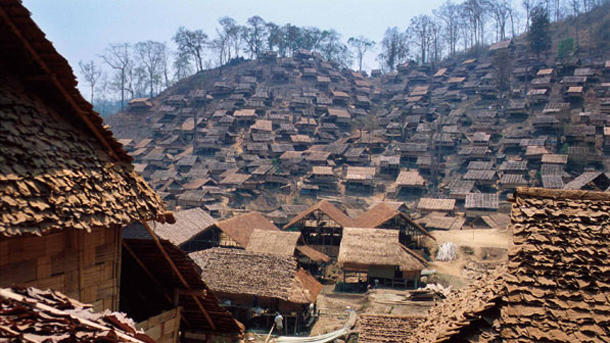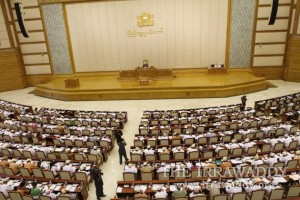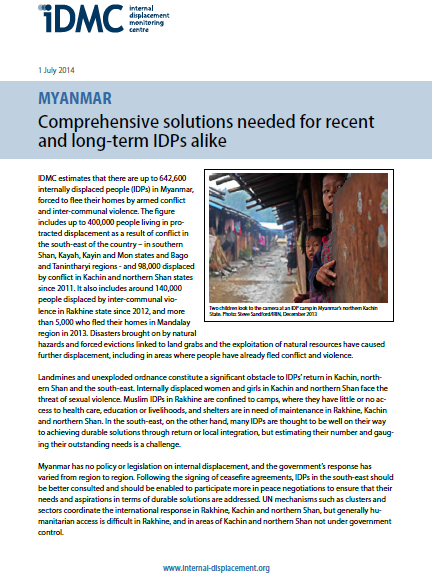Posts Tagged ‘UNHCR’ (24 found)
Flurry of Rumor and Counter Rumor Regarding Repatriation is Detrimental to Refugees
 A week ago, rumors began doing the rounds that the Thai military plans to repatriate the 130,000 or so displaced persons from Burma living in nine camps in Thailand along the length of the Burma-Thailand border in the relatively immediate future. The rumors started when General Prayuth Chan-o-cha, Head of the National Council for Peace and Order (NCPO), mentioned that the refugee issue had been discussed with Senior General Min Aung Hlaing, Commander-in-Chief of the Burma Army. On 14 July, the Bangkok Post then quoted an unnamed Thai military source saying that working teams have sorted 130,000 refugees into three groups as part of preparations to send them home, a process expected to take around a year or more. A Burma Border Guard Force officer also told Mizzima on 15 July that armed ethnic groups in Karen State would allegedly cooperate in the resettlement of refugees on their return home.
A week ago, rumors began doing the rounds that the Thai military plans to repatriate the 130,000 or so displaced persons from Burma living in nine camps in Thailand along the length of the Burma-Thailand border in the relatively immediate future. The rumors started when General Prayuth Chan-o-cha, Head of the National Council for Peace and Order (NCPO), mentioned that the refugee issue had been discussed with Senior General Min Aung Hlaing, Commander-in-Chief of the Burma Army. On 14 July, the Bangkok Post then quoted an unnamed Thai military source saying that working teams have sorted 130,000 refugees into three groups as part of preparations to send them home, a process expected to take around a year or more. A Burma Border Guard Force officer also told Mizzima on 15 July that armed ethnic groups in Karen State would allegedly cooperate in the resettlement of refugees on their return home.
However, according to DVB, Colonel Weerachon Sukondhadpatipak, a spokesman for the Thai military, refuted the rumors: “I don’t think this [repatriation] will happen at this moment. It is an issue we need to solve, but it doesn’t mean we are sending the Burmese people back to [Burma],” Weerachon said. “It is a long process that needs to be discussed with all concerned parties.” Indeed, nationalities would first need to be verified and people head-counted […]
• • •Displaced Persons from Myanmar in Thailand
Recently there have been intensified interests and news circulation about the displaced persons from Myanmar in Thailand. Below are clarifications on this issue […]
• • •Myanmar: Comprehensive Solutions Needed for Recent and Long-term IDPs Alike
IDMC estimates that there are up to 642,600 internally displaced people (IDPs) in Myanmar, forced to flee their homes by armed conflict and inter-communal violence. The figure includes up to 400,000 people living in protracted displacement as a result of conflict in the south-east of the country – in southern Shan, Kayah, Kayin and Mon states and Bago and Tanintharyi regions – and 98,000 displaced by conflict in Kachin and northern Shan states since 2011. It also includes around 140,000 people displaced by inter-communal violence in Rakhine state since 2012, and more than 5,000 who fled their homes in Mandalay region in 2013. Disasters brought on by natural hazards and forced evictions linked to land grabs and the exploitation of natural resources have caused further displacement, including in areas where people have already fled conflict and violence.
Landmines and unexploded ordnance constitute a significant obstacle to IDPs’ return in Kachin, northern Shan and the south-east. Internally displaced women and girls in Kachin and northern Shan face the threat of sexual violence. Muslim IDPs in Rakhine are confined to camps, where they have little or no access to health care, education or livelihoods, and shelters are in need of maintenance in Rakhine, Kachin and northern Shan […]
• • •World Refugee Day is a Timely Reminder that the Rights of Refugees Must Be Respected
 The Royal Thai Army’s Internal Security Operations Command (ISOC) last week requested, at short notice, to meet with representatives of the UN High Commissioner for Refugees (UNHCR) and local NGOs to discuss how refugees from Burma currently living in various camps along the Thai-Burma border can be repatriated in the near future. It is notable, however, that while regional military commanders were present at these meetings, no representatives from the refugee camps themselves or from community-based organizations (CBOs) assisting them were invited. The obvious and disturbing implication is that a decision on the status of refugees inside Thailand is likely to be made in the very near future with minimal consultation with affected parties. Moreover, the timing is not just premature and ill-considered, it is bitterly ironic given that last Friday, 20 June, was #WorldRefugeeDay.
The Royal Thai Army’s Internal Security Operations Command (ISOC) last week requested, at short notice, to meet with representatives of the UN High Commissioner for Refugees (UNHCR) and local NGOs to discuss how refugees from Burma currently living in various camps along the Thai-Burma border can be repatriated in the near future. It is notable, however, that while regional military commanders were present at these meetings, no representatives from the refugee camps themselves or from community-based organizations (CBOs) assisting them were invited. The obvious and disturbing implication is that a decision on the status of refugees inside Thailand is likely to be made in the very near future with minimal consultation with affected parties. Moreover, the timing is not just premature and ill-considered, it is bitterly ironic given that last Friday, 20 June, was #WorldRefugeeDay.
We call upon all parties to respect the UN 1951 Convention and 1967 Protocol Relating to the Status of Refugees, which represents international law as regards the rights of refugees, and is at the very least morally persuasive if not legally binding on the parties concerned. We also call upon all parties to include representatives of the refugee camps and of CBOs in any future meetings on the status of refugees or their potential repatriation. Furthermore, we urge all parties to ensure that repatriation of refugees only takes place when circumstances are appropriate, it is genuinely safe to return, all refugees’ rights are guaranteed by the Burma government, and that, most importantly, such repatriation is completely voluntary[…]
• • •Karen Women’s Organization Letter of Appeal on World Refugee Day
I am a woman. I am a refugee. This is my life. Listen to my voice. On World Refugee Day, it is our desire to appeal to the governments, to UNHCR and to all stakeholders, that the rights of refugees be valued and respected […]
• • •Humanitarian Crisis Update for Kachin State and Northern Shan State
It has been more than 30 months since armed clashes between the Myanmar government armed forces and the Kachin Independence Army (KIA) forces were first rekindled in 2011, resulting in more than 120,000 IDPs. Despite the ongoing peace negotiations, skirmishes between the Myanmar government armed forces and the Kachin Independence Army (KIA) have been increasing […]
• • •More cooperation vital to protect refugees
By Khin Ohmar
The Office of the UN High Commissioner for Refugees and community-based organisations working on Myanmar refugee issues have not always seen eye to eye.
Community-based organisations in the past have criticised the UNHCR for not being transparent about its discussions with the governments of Myanmar and Thailand over their plans for the refugees. The community groups also believe it has not recognised the important role they can play in the planning and decision-making processes leading to the eventual return of refugees to Myanmar […]
• • •The Death of Phyo Wai Aung: Myanmar’s Brutal Institutions Claim Another Victim
At the twentieth session of the Human Rights Council, the Asian Legal Resource Centre (ALRC) drew the attention of delegates—not for the first time—to the case of Phyo Wai Aung, a young man falsely convicted of involvement in a bombing attack during 2010 that killed 10 people and injured scores […]
• • •Will Myanmar’s War Refugees be Forced Home Against their Will?
They can’t live like this forever. Many of the 160,000 refugees evading conflict in eastern Myanmar inhabit a purgatory of thatch-roofed shanties across the river border in Thailand. Life in the United Nations-monitored camps is dreary and monotonous […]
• •A Year of Nascent Reforms to Build Upon
 2012 has been an eventful year for Burma – a year of initial steps hopefully in the right direction as well as several hurdles that pose serious challenges to the reform process.
2012 has been an eventful year for Burma – a year of initial steps hopefully in the right direction as well as several hurdles that pose serious challenges to the reform process.
In April, Daw Aung San Suu Kyi and 42 other members of the National League for Democracy won their parliamentary seats in a landslide victory for the party. However, parliamentary procedures are obscure and NLD and other progressive MPs are outnumbered by those from the Union Solidarity and Development Party and the military, making it difficult to raise important issues, repeal oppressive laws or push for amendments to draft legislations.
This year, we have seen the release of a significant number of political prisoners. While the freedom of these crucial players in the democratic process was welcomed, the opportunistic nature of the releases and the existing charges against those released cast a dark shadow. Hundreds of political prisoners remain in jail and authorities continue to arrest outspoken activists, including most recently those who have protested against the Letpadaung copper mine, one of many cases of land confiscation throughout the country […]










 All posts
All posts